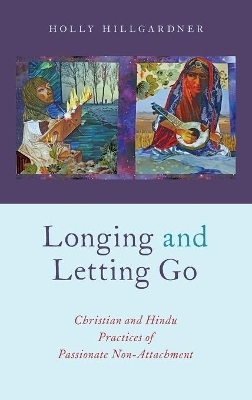
Longing and Letting Go
Christian and Hindu Practices of Passionate Non-Attachment
Seiten
2016
Oxford University Press Inc (Verlag)
978-0-19-045553-8 (ISBN)
Oxford University Press Inc (Verlag)
978-0-19-045553-8 (ISBN)
Can we love God and others without our desires eclipsing the very beauty, integrity and diversity toward which we are drawn; that is, can we love without trying to possess?
Longing and Letting Go explores and compares the energies of desire and non-attachment in the writings of Hadewijch, a thirteenth-century Christian Beguine, and Mirabai, a sixteenth-century Hindu bhakta. Through an examination of the relational power of their respective mystical poetics of longing, the book invites interreligious meditation in the middle spaces of longing as a resource for an ethic of social justice: passionate non-attachment thus surfaces as an interreligious value and practice in the service of a less oppressive world.
Mirabai and Hadewijch are both read through the primary comparative framework of viraha-bhakti, a mystical eroticism from Mirabai's Vaisnava Hindu tradition that fosters communal experiences of longing. Mirabai's songs of viraha-bhakti are conversely read through the lens of Hadewijch's concept of "noble unfaith," which will be construed as a particular version of passionate non-attachment. Reading back and forth across the traditions, the comparative currents move into the thematics of apophatic theological anthropology, comparative feminist ethics, and religiously plural identities. Judith Butler provides a philosophically complementary schema through which to consider how the mystics' desire, manifest in the grief of separation and the erotic bliss of near union, operates as a force of "dispossession" that creates the very conditions for non-attachment. Hadewijch's and Mirabai's practices of longing, read in terms of Butler's concept of dispossession, offer clues for a lived ethic that encourages desire for the flourishing of the world, without that passion consuming the world, the other, or the self.
Longing--in its vulnerable, relational, apophatic, dispossessive aspects--informs a lived ethic of passionate non-attachment, which holds space for the desires of others in an interrelated, fragile world. When configured as performative relationality and applied to the discipline of comparative theology, practices of longing decenter the self and allow for the emergence of dynamic, even plural, religious identities.
Longing and Letting Go explores and compares the energies of desire and non-attachment in the writings of Hadewijch, a thirteenth-century Christian Beguine, and Mirabai, a sixteenth-century Hindu bhakta. Through an examination of the relational power of their respective mystical poetics of longing, the book invites interreligious meditation in the middle spaces of longing as a resource for an ethic of social justice: passionate non-attachment thus surfaces as an interreligious value and practice in the service of a less oppressive world.
Mirabai and Hadewijch are both read through the primary comparative framework of viraha-bhakti, a mystical eroticism from Mirabai's Vaisnava Hindu tradition that fosters communal experiences of longing. Mirabai's songs of viraha-bhakti are conversely read through the lens of Hadewijch's concept of "noble unfaith," which will be construed as a particular version of passionate non-attachment. Reading back and forth across the traditions, the comparative currents move into the thematics of apophatic theological anthropology, comparative feminist ethics, and religiously plural identities. Judith Butler provides a philosophically complementary schema through which to consider how the mystics' desire, manifest in the grief of separation and the erotic bliss of near union, operates as a force of "dispossession" that creates the very conditions for non-attachment. Hadewijch's and Mirabai's practices of longing, read in terms of Butler's concept of dispossession, offer clues for a lived ethic that encourages desire for the flourishing of the world, without that passion consuming the world, the other, or the self.
Longing--in its vulnerable, relational, apophatic, dispossessive aspects--informs a lived ethic of passionate non-attachment, which holds space for the desires of others in an interrelated, fragile world. When configured as performative relationality and applied to the discipline of comparative theology, practices of longing decenter the self and allow for the emergence of dynamic, even plural, religious identities.
Holly Hillgardner is Assistant Professor of Religious Studies at Bethany College.
Acknowledgments
1. The Paradox of Longing and Letting Go
2. Mirabai's Love-Longing and Passionate Non-Attachment
3. Looking Closer: Mirabai's Voices of Longing and Letting Go
4. Hadewijch's Love-Longing and Passionate Non-Attachment
5. Looking Closer: Hadewijch's Voices of Longing and Letting Go
6. Longing and Letting Go Together: Comparative Practices of Passionate Non-Attachment
7. Becoming Undone: Mirabai, Hadewijch and Dispossession
8. Toward an Interreligious Ethic of Passionate Non-Attachment
Bibliography
Index
| Erscheinungsdatum | 30.11.2016 |
|---|---|
| Reihe/Serie | AAR Academy Series |
| Verlagsort | New York |
| Sprache | englisch |
| Maße | 236 x 157 mm |
| Gewicht | 408 g |
| Themenwelt | Religion / Theologie ► Christentum ► Kirchengeschichte |
| Geisteswissenschaften ► Religion / Theologie ► Hinduismus | |
| ISBN-10 | 0-19-045553-5 / 0190455535 |
| ISBN-13 | 978-0-19-045553-8 / 9780190455538 |
| Zustand | Neuware |
| Haben Sie eine Frage zum Produkt? |
Mehr entdecken
aus dem Bereich
aus dem Bereich
von Athanasius bis Gregor dem Großen
Buch | Softcover (2024)
C.H.Beck (Verlag)
CHF 18,90
eine Geschichte der christlichen Kunst
Buch | Hardcover (2024)
C.H.Beck (Verlag)
CHF 44,75


